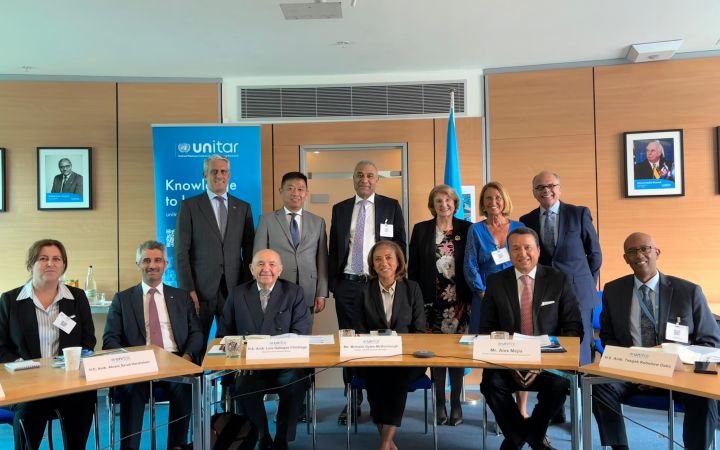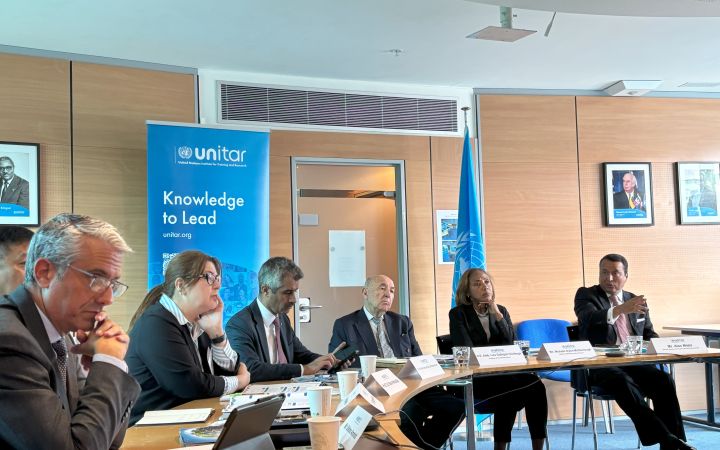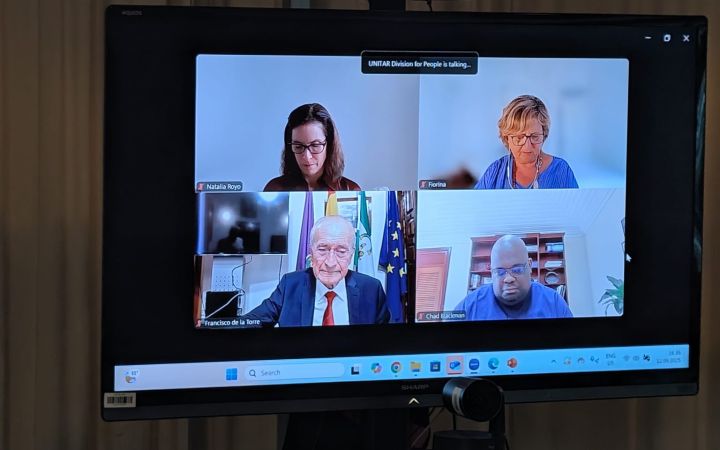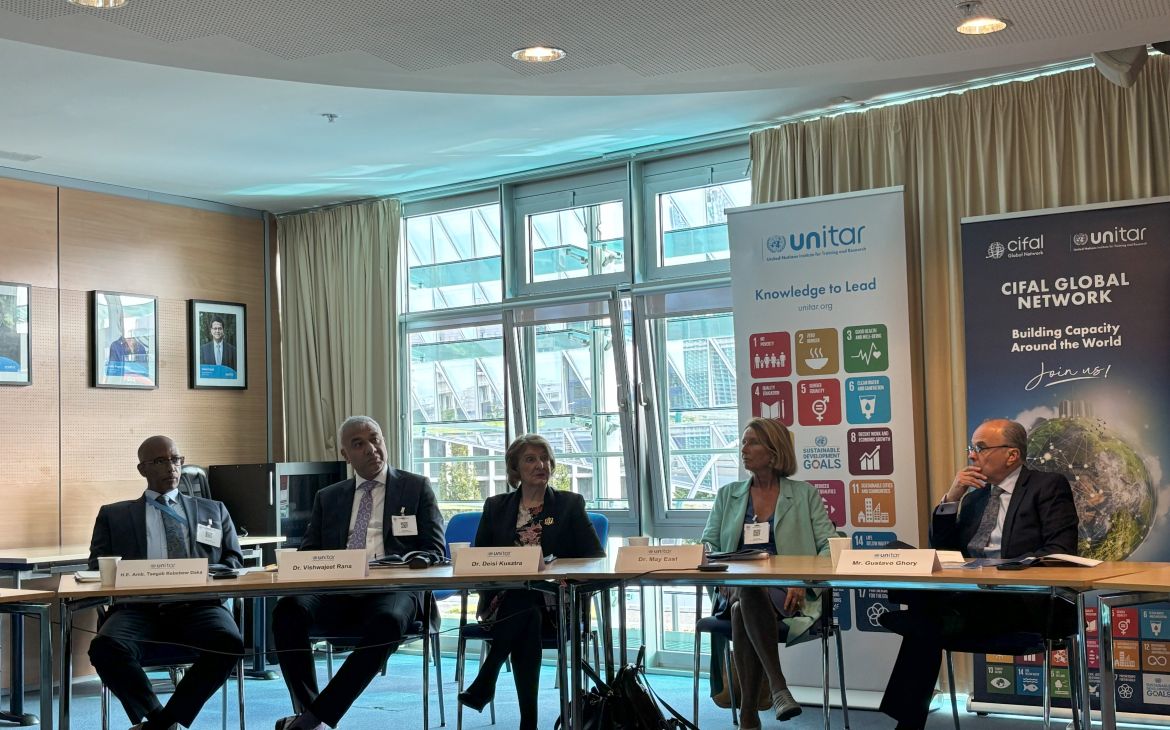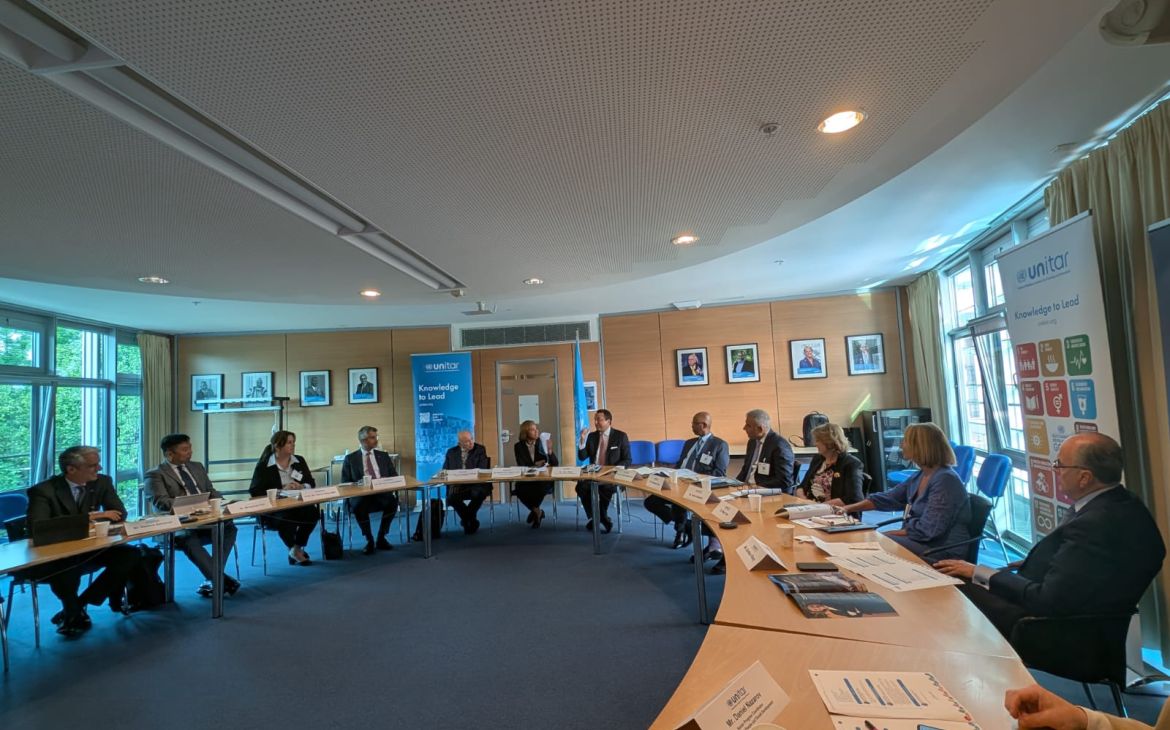6 October 2025, Geneva, Switzerland - The Advisory Board of UNITAR’s Division for People and Social Development convened on 12 September 2025. The session, chaired by UNITAR’s Executive Director, UN Assistant Secretary-General Ms. Michelle Gyles-McDonnough, underscored the Division’s central role in equipping individuals, institutions, and governments with the skills and capacities needed to meet today’s pressing global challenges.
In her opening remarks, Ms. Gyles-McDonnough highlighted UNITAR’s enduring mission of empowering learners worldwide through knowledge-sharing and capacity-building. She stated:
Looking ahead, with changes in the global and financial landscape, training and capacity-building must remain at the forefront of multilateralism. Equally important is to create spaces for dialogue and to build capacity to bring to fruition sustainable development, as the new global economy calls for change management and transformation.
She emphasised that the Division for People and Social Development is uniquely positioned to respond to these global shifts, providing training with a focus on education, health, resilience building, local governments, sustainable mobility, anticorruption, digital governance, youth, and intergenerational transitions.
Division for People's Expanding Reach
Mr. Alex Mejia, Director of the Division for People and Social Development, offered a comprehensive overview of the Division’s portfolio, including its thematic priorities. Mr. Mejia highlighted the outcomes of recent needs assessment mappings and underlined the Division’s significant presence in Least Developed Countries (LDCs) and Low and Middle-Income Countries (LMICs). Notably, in 2024, the Division trained more than 220,000 people, accounting for 39 per cent of UNITAR’s total beneficiaries.
He outlined the expanding role of the CIFAL Global Network, which has grown into a key platform for knowledge exchange and outreach, spanning multiple regions and sectors. Alongside this, he drew attention to specialised programmes for vulnerable populations, including youth, women, migrants, refugees, and older persons.
Insights from Advisory Board Members
The Advisory Board members contributed a wide spectrum of perspectives, each drawing on their distinct expertise and national contexts.
The Hon. Chad Blackman, Minister of Educational Transformation, stressed the urgent need to invest in skills development, particularly in Small Island Developing States, and underlined the importance of embedding gender considerations into programme design.
The Hon. Francisco de la Torre Prados, Mayor of Malaga, reported on the achievements of CIFAL Malaga, which recently marked its seventh anniversary, and highlighted the expansion of the Green Helmets reforestation initiative.
Mr. Victor D’Aza, President of the Liga Municipal Dominicana, expressed his gratitude for being appointed to the Advisory Board.
It is pivotal for local and regional actors, such as municipalities, to join forces and pool limited resources towards solving larger challenges
, he said.
H.E. Amb. Tsegab Kebebew Daka, Permanent Representative of the Federal Democratic Republic of Ethiopia to the United Nations Office at Geneva, encouraged collaboration with technology start-ups to foster innovation for youth and development, while stressing the importance of strengthening early-warning systems and data management, noting that “nobody is immune from disasters”.
H.E. Amb. Natalia Royo de Hagerman, former Ambassador of the Republic of Panama to the United Kingdom of Great Britain and Northern Ireland, reaffirmed Panama’s leadership on climate and water governance and shared her country’s aspiration to host a CIFAL Centre, reflecting its commitment to sustainability.
Education was another recurring theme. Prof. Dr. Esra Hatipoğlu, Rector of Bahçesehir University, pointed to the growing importance of vocational training and micro-credentials as alternatives to traditional higher education. Dr. Vishwajeet Rana, Group Chief Executive Officer of GEDU Global Education, added that distance learning and demand-driven approaches are becoming increasingly vital to meet the needs of the new generation of learners and stressed the importance of tailoring education to an increasingly diverse pool of beneficiaries.
Mr. Stefano Ammirati, Director for Road Safety and Global Advocacy at the Fédération Internationale de l’Automobile (FIA), underlined his organization’s global commitment to road safety and sustainable transport, noting its close alignment with UNITAR’s capacity-building mission, especially under the framework of meeting the UN Decade of Action for Road Safety. He equally praised the role of multilateral cooperation in advocating for sustainable mobility goals.
Dr. Mingchao Fan, Executive Vice President of the Shanghai Arbitration Commission (SHAC), highlighted the role of international law and arbitration in resolving cross-border issues, such as water governance and energy, pointing to the importance of education and continuous dialogue in fostering cooperation.
Dr. Gustavo Lopez Ghory, Chairman of the SmarterChains Foundation, stressed the importance of education as a driver of equity and development, particularly for young people. He underlined five areas of focus: energy, health, food, climate, and education, and reminded members of the need to improve accessibility to technology and infrastructure.
Other contributions included Ms. Fiorina Mugione, Director for Africa, the Caribbean, and the Pacific at the Global Development Solutions Initiative (GDSI), who called for stronger Private-Public-Partnerships (PPP), especially within the scope of the UN collaborating with private enterprises; Dr. Deisi Kusztra, President of the World Family Organization for family-centred development; and Dr. May East, international urbanist specialised in nature-positive and gender-sensitive cities reflection, on megatrends such as urbanisation, gender parity, and decarbonisation. She urged the Board to view transformation not only as problem-solving but also as identifying potential.
Conclusion
In his closing remarks, H.E. Ambassador Luis Gallegos extended his sincere gratitude to the Advisory Board members for their active engagement, noting that the constructive discussions had reaffirmed the vital role of the Division for People and Social Development in advancing UNITAR’s mandate and supporting Member States in achieving the Sustainable Development Goals.
H.E. Amb. Gallegos drew attention to the key themes that had emerged during the session: the need for greater inclusion of youth, women, and persons with disabilities; the importance of capacity-building as a foundation for resilience and transformation; and the power of innovation and partnerships to deliver tangible impact for communities.
He closed with a call to action, reminding members of their responsibility to turn the day’s insights into concrete recommendations.
We must act as advocates and partners in promoting UNITAR’s work, while sharing our expertise and mobilising support within our respective countries and organizations.


